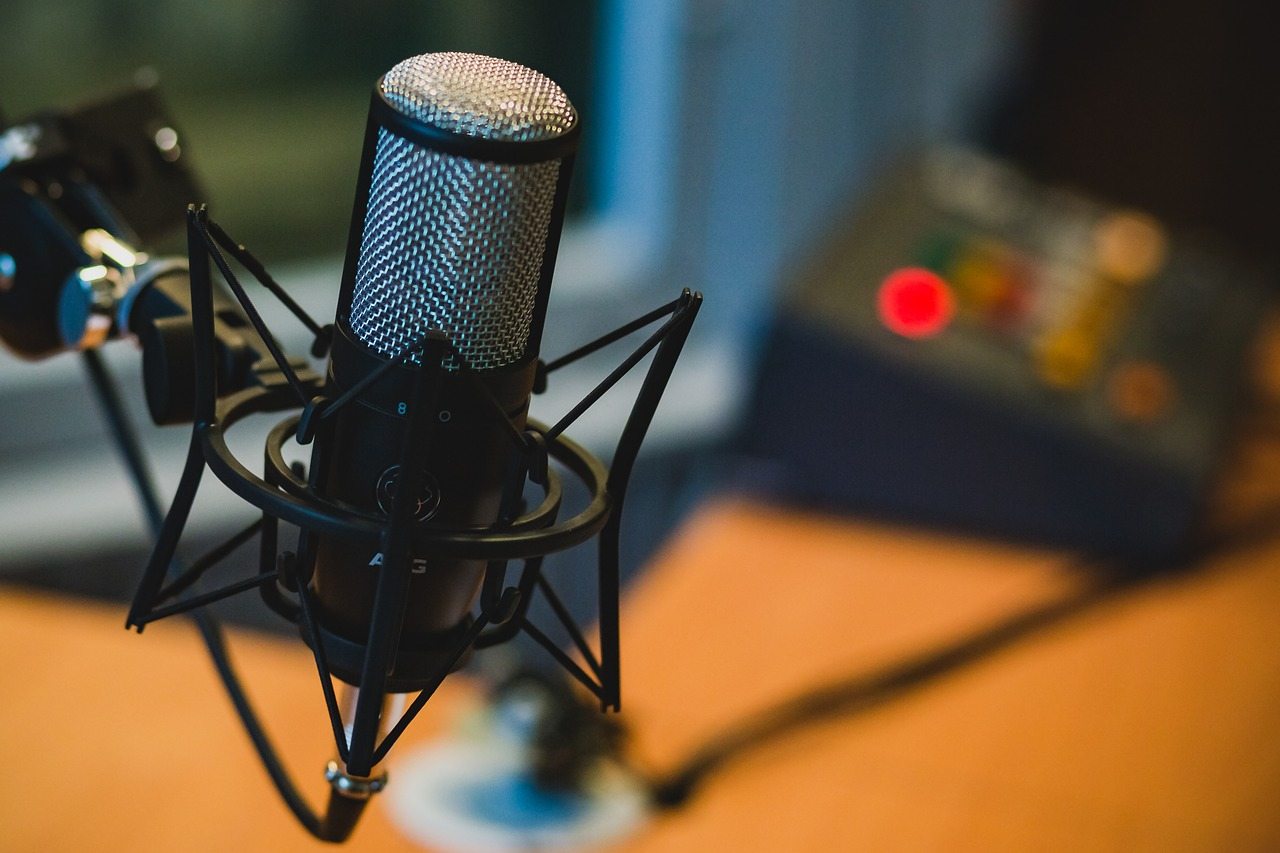Tuning into Tales
An Interview with Bob Carlson
by Jenny Chi
 Bob Carlson is an award winning audio producer, musician and broadcaster. He’s the host and producer of UnFictional, a weekly program of unusual stories and compelling personal documentaries airing on KCRW radio, and podcast on KCRW.com. During his long career at KCRW, he served as director of production and shaped the station’s unique sound as a music engineer, DJ and radio drama creator. His work has also been heard on NPR, the BBC and many other places.
Bob Carlson is an award winning audio producer, musician and broadcaster. He’s the host and producer of UnFictional, a weekly program of unusual stories and compelling personal documentaries airing on KCRW radio, and podcast on KCRW.com. During his long career at KCRW, he served as director of production and shaped the station’s unique sound as a music engineer, DJ and radio drama creator. His work has also been heard on NPR, the BBC and many other places.
Bob took time out to talk to us about his roots, his work, his criteria for great broadcast storytelling, and his most memorable aired stories.
We’re very privileged to have Bob teaching Radio Storytelling at Writing Pad!
1. How did you get your start in audio producing?
I actually studied radio in college (Emerson College in Boston). After that I worked at some commercial radio stations as a DJ. At one time I worked at one of those radio stations that look like a shack in the middle of the desert. During that time I was always drawn to the production aspect of the job; working in the studio, making programs and commercials. Eventually I started at KCRW, first as a volunteer, then as a recording engineer and finally Director of Production.
2. You produce the show UnFictional, a program of real-life stories and documentaries told by talented independent writers and performers. What do you look for in a story when you are choosing what to air on your show?
I look for stories that have a viscerally interesting topic, like crime, secrets, mysteries, obsessions, or life changing situations. I also like characters that live in a world that I’ve always wondered about, like bathroom attendants, mariachis, or nuclear missile launch officers. I like stories that have twists and surprises, that don’t go in the direction you’re expecting.
Funny stories are great, of course, but I particularly like stories that feel human. They humor AND emotion. I like the listener to feel like they’ve been through something significant with the character, like a good novel or a short story.
3. What is the difference between broadcast and performed storytelling?
It depends on the storyteller, but the main difference is probably the dynamics of the performance. When you’re on stage, you’re standing in front of a group of people and you have to project enough energy to command attention. Big is better, big laughs and big moments. On stage you’re trying to create a communal experience for the audience, and the energy you create in the room is part of the experience.
A story on the radio is more like telling someone a story over dinner, or even whispering in their ear. People are often listening to the radio or a podcast when they’re alone, or at least isolated from the world by wearing headphones. Performances can be more understated and subtle. Rather than creating a group experience, you’re practically being a voice in someone’s head, so you can tap more directly into their emotions and personal memories and experiences.
4. You also host UnFictional, and have had various on-air broadcasting experiences. How do you think these hosting experiences have influenced your career as a radio producer?
There is a ton of interesting audio work that goes on at KCRW, and I’ve done it all. I mixed live performances for the music shows, recorded and edited hundreds of talk shows. Having all that practice of listening to voices and hearing people tell stories gave me a good sense of what works and what doesn’t.
Also, at one time KCRW even produced radio dramas and story series’. That’s how I realized that often the most compelling type of storytelling on the radio is simply a single talented person telling a great story.
5. How did you come up with the idea for UnFictional?
One of my closest colleagues over my many years at KCRW has been Jennifer Ferro, who is now general manager. She and I were longtime fans of the work of independent radio producers. So in 2010 she asked me to put together an outlet to highlight great work, and create new stuff.
6. Before working on UnFictional, you served as KCRW’s Director of Production. What creative direction did you take the radio station to and how did you determine that?
The biggest thing that happened while I was Production Director was the explosion of digital technologies for production. As a producer, all of a sudden you had incredible flexibility and capabilities. Now, one person could create intricately produced work that wasn’t even possible before.
Because of this, my contribution was to add an emphasis on craft and quality. We outfitted the studios with new equipment and used advanced techniques. The result was that our live music performances now often sound as good as studio recordings. Plus we were able to craft our interviews more, keep the good stuff and get rid of the boring stuff. All done more quickly and effectively. Plus we were able to start producing sophisticated documentary work, which ended up as an important step toward the kind of work I’m doing on UnFictional.
7. What advice would you give to DJs and hosts hoping to break into the field of radio producing?
No breaking-in necessary, just go and do it! The tools you need to do audio work are so cheap now, that if you have a passion for it, the cost of entry is low. It’s also vital to listen to a lot of the great work being done on the radio and podcasts nowadays. Once you’ve developed a style and you have work you want to share, there are many ways to distribute your work online.
8. What was the most memorable story that aired on UnFictional?
I get so deeply entrenched in the details of producing the stories for my program that I barely forget any of them. That said, one of my most memorable moments happened when I was first developing the show. At the time I had a vague idea of what the tone of the show should be, but I probably wouldn’t have been able to articulate it.
A friend of mine invited my wife and I to a literary reading. While I was there I saw a writer named Dave White read a story he’d written. He was direct and matter of fact, almost a little scary. At the same time though, he projected a vulnerability that made it clear he had suffered plenty of psychological wounds in his life. Most importantly he was freaking hilarious. Immediately I could see the tone of my show defined right in front of me. And in fact, Dave White was on an early episode of my show, and several others since.
9. Can you give us a preview of the special techniques for selecting and producing stories that participants will learn in your class?
A good story will have something at stake, and say something that people can identify with on some level. It shouldn’t be a one-joke story, mean spirited or silly. Even a simple or funny story can say something profound.
Writing for radio should sound more like talking than writing. A listener can’t go back and re-read if they missed something. Radio writing should use clear, short declarative sentences, complicated sentence structures are for print.
Thank you so much for that informative interview, Bob!
Catch Bob’s Radio Storytelling class at Writing Pad.


